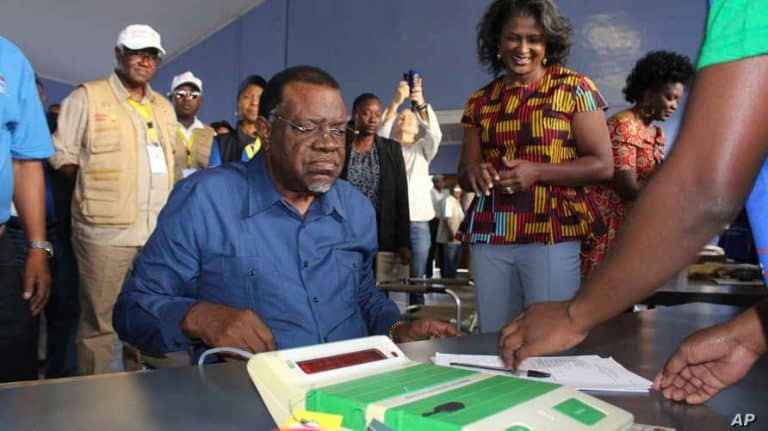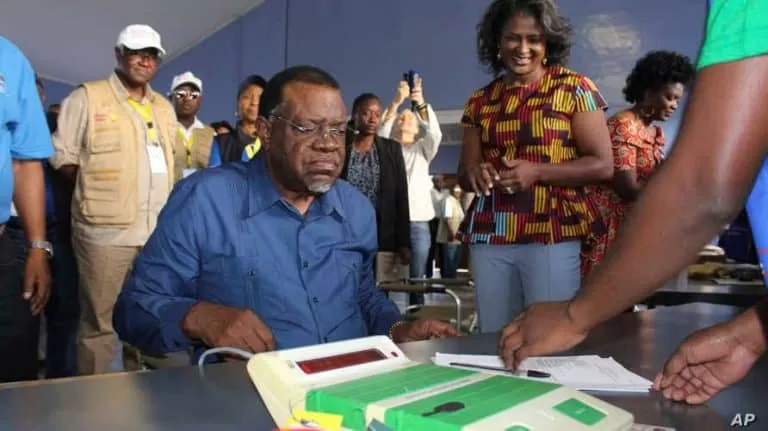

Last updated on September 11th, 2021 at 03:11 pm
Namibia’s president Hage Geingob on Friday looked set to secure a second term with partial results from this week’s general election showing him leading with 56% of the vote.
The southwestern African country held its sixth presidential and parliamentary elections on Wednesday amid economic woes and growing frustration against the regime.
Geingob’s South West Africa People’s (SWAPO) party has been in power since Namibia’s independence from South Africa in 1990, and is widely hailed for its role in the liberation struggle.
But the president – who was elected with a sweeping 87% majority in 2014 – is predicted to lose a share of votes to a breakaway SWAPO member running as an independent candidate, former dentist Panduleni Itula.
The breakaway candidate is particularly popular among youth frustrated by the lack of jobs and too young to remember the SWAPO-led war for independence.
Partial results published by the Electoral Commission of Namibia after around 65% of the votes were counted showed Geingob leading with 56.08%, followed by Itula with 28.49%.
PDM candidate and second-time runner McHenry Venaani was third with 5.71%.
SWAPO was also ahead in parliament with 65.34% of the vote.
The party’s long-standing opponent, the Popular Democratic Movement (PDM), was a distant second at 15.67%.
Corruption scandal
SWAPO looks likely to retain the two-thirds majority in the 76-member parliament it has enjoyed since 1994.
But Geingob’s popularity has slipped. His first term was overshadowed by a recession, and his credibility took a hit over a giant fishing scnadal that erupted just before the election.
A series of leaked documents alleged that senior government officials awarded horse mackerel quotas to Samherji, one of Iceland’s biggest fishing firms, in exchange for bribes.
Fishing is one of Namibia’s key economic sectors, second only to mineral mining.
Two ministers resigned but have denied any wrongdoing. They appeared in court Thursday over alleged bribes of $10 million.
The saga took another twist on Friday when two South African lawyers representing the former ministers were detained for operating without work permits.
Namibia’s chief immigration officer Nehemia Nghishekwa told AFP the lawyers would be brought to court and were likely to spend the night in custody.
‘Generally peaceful’
Around 1.4 million of Namibia’s 2.4 million population were registered to vote. Half were under 37 and around a third born after 1990.
The election was “generally peaceful, well organised and conducted in a professional manner,” the Southern African Development Community (SADC) regional bloc said Friday.
Commonwealth observers echoed that assessment and said the polls were “carried out in a largely peaceful and orderly manner”.
Namibia was the first country in Africa to introduce electronic voting machines in 2014.
The machines – opposed by opposition parties fearing the lack of paper could facilitate fraud – were meant to accelerate the voting and counting process.
But the voting process was painfully sluggish and had people queueing for hours.
“We observed that the processing of voters remains slow, thereby resulting in an arduous polling experience for many voters,” said the head of the Commonwealth Observer Group.
SADC recommended better training and “voter education” around the use of these machines.
The Gujarat Titans (GT) team confirmed Thursday that fast bowler Kagiso Rabada is taking an early IPL 2025 exit to…
The International Finance Corporation gives Raxio Group $100 million to accelerate their data center building efforts throughout Sub-Saharan African regions.…
The Oklahoma City Thunder secured their tenth consecutive victory by beating the Chicago Bulls 145-117. This victory raised their season…
The Board of Control for Cricket in India introduced a detailed list of cricket matches that will take place at…
Rob Walter Resigns his Position as coach for the Proteas men's team for white-ball games because personal problems needed attention.…
Starting April 2, South African drivers will get lower costs when filling their tanks as fuel prices decrease for all…
This website uses cookies.